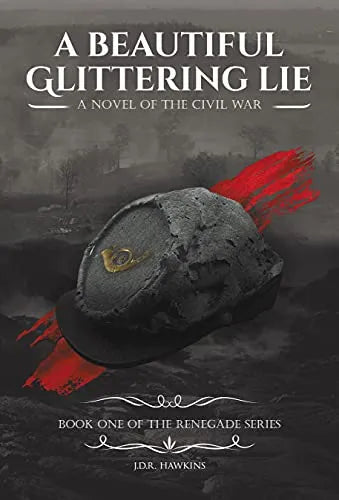
I am frequently asked how I came up with the title for my novel, A Beautiful Glittering Lie (the first book in the Renegade Series). I derived it from this wonderful quote, which a Confederate soldier wrote in his journal.
“For it was the first Field of Glory I had seen in my May of life, and the first time that Glory sickened me with its repulsive aspect, and made me suspect it was all a glittering lie.” – Henry Morton Stanley, C.S.A.
It is difficult to imagine what went through the young soldiers’ minds when they finally “saw the elephant” – horrifying, no doubt, and exhilarating at the same time. But soldiers weren’t the only ones who experienced such terror. This excerpt describes how their loved ones must have felt. Some of them never received word of what had happened to their brave soldiers. War always involves tragedy, but I think not knowing would be the worst part.
Word of the battle quickly spread to Huntsville, and within days, filtered down into Morgan County. Caroline had mentally prepared herself for what she anticipated would happen, but when the first battle finally did take place, she found herself ill-equipped. She did her best to shelter her brood, but realized it was just a matter of time before they learned of the event.
The following week, she found out that a list of fatalities had been posted, and knew she had to drive to Ben Johnson’s mercantile to have a look, but all the while, her heart felt as though it was breaking. She dreaded the list, dreaded the result of the terrible fighting, and especially, dreaded what the war might be doing to her home. Going alone, she reached her destination, climbed down from the wagon, hitched her draft horse, and approached the two-story wooden structure, her ankle boots clunking up the wooden steps and across the porch’s floorboards as she walked. She pulled the front door open, and a tiny bell above it announced her arrival. As she entered, she saw several others gathered around a notice that had been tacked to the wall. Ben Johnson nodded. He threw a glance toward the posted list. She knew what it meant.
Slowly, feeling as though she was floating, she passed by the dry goods, glass cases displaying pottery, clothing and sewing notions, and under farm equipment hanging from the ceiling rafters, approaching the others. Some of the women were sobbing, covering their faces with handkerchiefs, while others turned away and stared at her with vacant eyes. As they drifted off, she stepped toward the ominous poster, held her breath, and forced herself to gaze upon the names. When she had reached the bottom, she breathed a sigh of relief. Hiram’s name wasn’t on the list, although she recognized one who was. Turning toward the counter, she wiped a trickling tear from her cheek as she walked over, and requested a copy of the Southern Advocate.
Initially at a loss for words, Ben cleared his throat. “I reckon Hiram’s name ain’t on there,” he finally said.
The revelation had started sinking in. Caroline smiled. “No, thankfully not.”
Ben returned the smile. “Right glad to hear it.” He handed her a newspaper. “The editor of this paper, Mr. William Figures, has a son who’s with your husband’s regiment.”
“Oh?” she replied cordially. “He’s all right ain’t he? I mean, I didn’t see …”
“Yes ma’am, far as I can tell.”
“That’s mighty fine. Well, I’ll be on my way. Good day, Mr. Johnson.”
She turned to leave, and as she opened the paned-glass door, Ben called out, “When you write to that man of yours, tell him I said hello.”
“I surely will,” she replied. Walking out to the wagon, she untied Joe Boy, climbed aboard, and slapped the reins. She drove out of view from the mercantile, and pulled the vehicle to a stop. Uncontrollably, she burst into tears, sobbing convulsively until the ache in her heart finally subsided. She couldn’t show her weakness to her children: for them she had to be strong. After wiping her eyes with her handkerchief, she drove on toward home.

